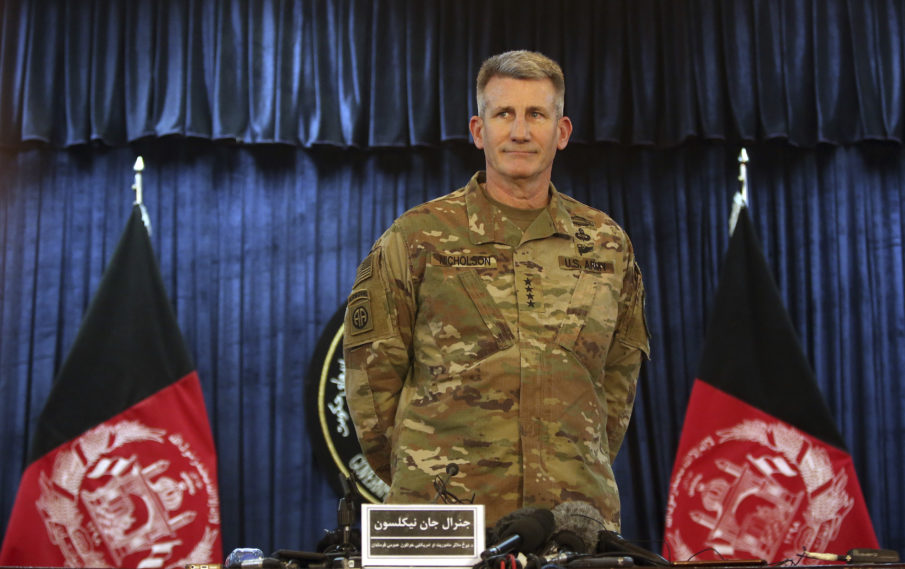Rank has its privileges.
Sgt. Bowe Bergdahl entered a courtroom in Fort Bragg, North Carolina on 16 October 2017 to plead guilty to desertion and misbehavior before the enemy for leaving his post in Afghanistan eight years ago on 30 June 2009 when he was a 23-year-old Private First Class.
Today, General John Nicholson commands all coalition forces in Afghanistan from his command office in Kabul, Afghanistan as a 60-year-old four-star general. 10 years ago, as a 50-year-old colonel, he publicly condemned the first Marine Special Operations Company of, “killing and wounding innocent Afghan civilians” when he did not have any evidence to support his statements.
These two U.S. Army soldiers are a world apart not only from their ranks and geography but because of privilege. Today Sgt. Bergdahl voluntarily plead guilty to desertion and misbehaving before the enemy. The latter who was twice the age of Private First Class Bergdahl at the time of his conduct and who had served over eight times as long at the time of his conduct has never admitted to any misbehavior.
What exactly does the military’s Uniform Code of Military Justice Article 99 state as “misbehavior before the enemy” which Sergeant Bergdahl has plead guilty to? Any member of the Armed Forces who before or in the presence of the enemy (the military only is required to prove that a service member conducted any one of the following acts):
- runs away
- shamefully abandons, surrenders, or delivers up any command, unit, place, or military property which it is his duty to defend
- through disobedience, neglect, or intentional misconduct endangers the safety of any such command, unit, place, or military property
- casts away his arms or ammunition
- is guilty of cowardly conduct
- quits his place of duty to plunder or pillage
- causes false alarms in any command, unit, or place under control of the armed forces
- willfully fails to do his utmost to encounter, engage, capture, or destroy any enemy troops, combatants, vessels, aircraft, or any other thing, which it is his duty so to encounter, engage, capture, or destroy
- does not afford all practicable relief and assistance to any troops, combatants, vessels, or aircraft of the armed forces belonging to the United States or their allies when engaged in battle.
General Nicholson’s own 9 April 2007 command investigation regarding the 4 March 2007 attack stated:
- “(Marines) received a suicide vehicle borne improvised explosive device followed by a complex ambush from both sides of the road.”
- “(Marines) returned fire, drove through the ambush, and returned to base with one wounded.”
Less than one month later, then-Colonel John Nicholson in the presence of then Brigadier General Joseph Votel, publicly stated twice on 8 May 2007 both to the Afghan villagers and separately to the international press regarding the Marines Special Operators:
- “I am deeply, deeply ashamed and terribly sorry that Americans have killed and wounded innocent Afghan people.”
- “the death and wound of innocent Afghans at the hands of Americans is a stain on our honor,”
- “this was a terrible, terrible mistake,”
- “my Nation grieves with you,”
During the January 2008 Marine Court of Inquiry during a classified secret hearing which has since been declassified, General Nicholson admitted:
Already have an account? Sign In
Two ways to continue to read this article.
Subscribe
$1.99
every 4 weeks
- Unlimited access to all articles
- Support independent journalism
- Ad-free reading experience
Subscribe Now
Recurring Monthly. Cancel Anytime.
- When asked by the jury, “And you didn’t read any of the investigations, is that what you’re telling me?” Nicholson’s reply, “No, I – they did not include me in the investigation. I didn’t – interesting enough, they didn’t come and provide me a copy of the investigation to review anything.”
- “Yeah, I think, again, hindsight being 20/20 and being presented with more information than I had at the time, I would always be inclined to try to give the guy the benefit of the doubt. And initially, that’s, you know, that’s what I was trying to do here until it just seemed to be so obvious.”
Despite General Nicholson admitting his faults under sworn statement in a classified session of court, on 22 June 2012, he continued his slander of the Marines to a New York Times reporter Carlotta Gall. He was interviewed for her book, “The Wrong Enemy” where four and a half years after his errors were admitted under sworn testimony in a classified session of court, he further implicated the Marines to Gall, “It’s a matter of training, leadership, and discipline; there were lapses in all three.”
If the 31-year-old Sergeant Bergdahl understands his actions and that a court could convict him of any single basis of the Uniform Code of Military Justice’s Article 99, does the 60-year-old General Nicholson not believe his actions on 8 May 2007 also provide evidence of Article 99, misbehavior before the enemy? Specifically:
-shamefully abandons, surrenders, or delivers up any command, unit, place, or military property which it is his duty to defend
-through disobedience, neglect, or intentional misconduct endangers the safety of any such command, unit, place, or military property
-is guilty of cowardly conduct
-causes false alarms in any command, unit, or place under control of the armed forces
-does not afford all practicable relief and assistance to any troops, combatants, vessels, or aircraft of the armed forces
If General Nicholson provided classified sworn testimony in 2008 that he was wrong in “abandoning a unit which it is his duty to defend,” will the “People” of America demand that he publicly confesses his mistakes that have destroyed Marines who fought courageously?
Thanks to retired USMC Maj. Fred Galvin for his collaboration on this article.










COMMENTS